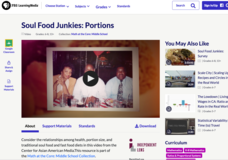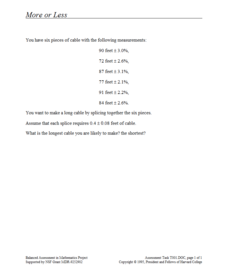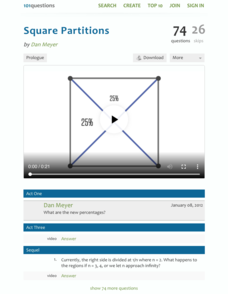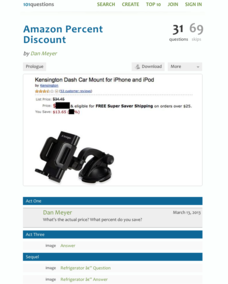CK-12 Foundation
Percents as Decimals
In some cases, decimals are just easier to work with. An easy-to-use interactive shows how to convert percents to decimals. It then challenges learners to answer a set of questions, some of which include percents that are greater than...
CCSS Math Activities
Smarter Balanced Sample Items: 6th Grade Math – Claim 4
Develop a model for prep. The resource provides examples of how items reflect modeling and data analysis for Smarter Balanced assessments. Items use on-grade or below-grade content to focus on the modeling aspect. The questions revolve...
CCSS Math Activities
Smarter Balanced Sample Items: 6th Grade Math – Claim 2
They claim there are problems on the assessment. The presentation provides 13 questions that demonstrate the problem-solving claim for Smarter Balanced assessments. Teachers use the resource to provide examples of problem-solving...
Mathed Up!
Percentages
Review a percentage of math skills. Designed to review for the General Certificate of Secondary Education Math assessment, the resource provides practice with a variety of percent problems. Items provide pupils problems ranging from...
CCSS Math Activities
Smarter Balanced Sample Items: High School Math – Claim 3
Communication is the key. A presentation provides 25 sample items for Claim 3, Communicating Reasoning, for the Smarter Balanced High School Math assessment. Items require pupils to answer the question and provide logical reasoning to...
PBS
Soul Food Junkies: Portions
Serve up a rate of percents. The Math at the Core resource investigates the percent of daily value of sodium and saturated fats in different foods. Pupils determine the number of serving sizes they eat of popular snack foods and...
PBS
The Lowdown — Rot and Rubbish: The Rancid Truth about How Much Food We Waste
Compare waste a percent at a time. The resource contains an infographic on food waste. Using images, the informative activity describes the amount and types of food waste that occur. Pupils compare the percentage of waste from their...
PBS
The Lowdown — Exploring Changing Obesity Rates through Ratios and Graphs
Math and medicine go hand-in-hand. After viewing several infographics on historical adult obesity rates, pupils consider how they have changed over time. They then use percentages to create a new graph and write a list of questions the...
PBS
The Lowdown — Examining California's Prison System: Real-World Ratio
Free yourself from the shackles of traditional math lessons. Young mathematicians investigate race, gender, and age differences in California's prison system. They use provided graphics to compare the prison population with the state's...
PBS
Real-World Proportional Relationships: Gender Wage Gap
When will the gender wage gap disappear? Scholars use a provided infographic to see trends in wage gap over time. They use ratios of women's wages to men's wages to determine which decades had the greatest change in the wage gap. The...
Concord Consortium
More or Less
How long can the cable get? A short performance task provides learners with information on the length of cables and the margin of error for each. They must determine the longest and shortest cable possible by splicing these cables.
Concord Consortium
Hockey Pucks
Package design is a mathematical task for any business. Young scholars use a package design to determine the number of packages required for specific shipments. Using ratios, proportions, and fractions, they make decisions about the best...
Mascil Project
Epidemics: Modelling with Mathematics
The Black Death epidemic is responsible for more than one million deaths in the United Kingdom. An inquiry-based activity has young scholars explore the rate of disease spread. They then analyze graphs showing data from epidemics such as...
CCSS Math Activities
Cereal
Your breakfast cereal is a good source of math practice. Young mathematicians apply ratios and percents to analyze the amount of protein and carbohydrates in two brands of cereal. They complete a worksheet to answer several questions on...
CCSS Math Activities
Sandwich Shop
Eat up the task on systems of equations. Given information on the total number of sandwiches and the total income, learners write and solve a linear system of equations to find the number of each type of sandwich sold at a shop. They...
101 Questions
Square Partitions
Challenge your classes while developing their problem-solving skills. A square is divided neatly into four equal triangles by its diagonals until one diagonal is moved from a vertex to the midpoint of one side. Now, scholars must devise...
101 Questions
Combining Coupons
Everyone likes to save money! Use your math skills to figure out just how much you can save on a pair of sweet shoes. A vendor is running a percent off sale, with a percent off coupon, and a specific dollar amount coupon—and lets you use...
101 Questions
Bed, Bath, and Beyond Coupon
More money for me! Scholars explore two different coupons for Bed Bath & Beyond, one for 20 percent off and one for $5 off an item. Using some concrete examples, they determine conditions for when each coupon would be more beneficial.
101 Questions
Amazon Percent Discount
Everyone loves a good sale! A straightforward lesson provides practice with calculating a percent off of a product. Using ads from Amazon, individuals calculate the percent off the ad does not show. Pupils see the answer after revealing...
101 Questions
The Biggest Loser
Sometimes losing is actually winning! Learners use a proportional analysis to compare percent weight loss of contestants on The Biggest Loser. The resource provides data and clips from the show to facilitate the lesson.
101 Questions
The Incredible Shrinking Dollar
Make money disappear! Young scholars watch as a copier shrinks a dollar bill to 75 percent of its size. Learners are left to determine the size of the dollar bill after nine passes through the copier.
101 Questions
Dueling Discounts
What a bargain—an informative, free resource! Given prices of several objects, learners determine whether 20 percent off or $20 off would be a better bargain. They use the results to come up with a generalization of the situation.
Chemistry Collective
Virtual Lab: Cola and Sucrose Concentration Problem
Recreate the secret Coca-Cola formula in a virtual lab. Young scholars create the solution and then calculate sucrose concentrations in terms of percent mass, molarity, molality, and mole fraction. Then using density, learners...
Yummy Math
Valentine’s Day = Roses
Roses are red, but did you know that some are lighter while others are darker? Scholars read an infographic to decipher the fraction and percent of rose color and their country of origin. They go on to make comparisons and estimate while...

























